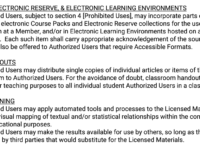Canadian copyright lobby groups have repeatedly tried to convince the government that the 2012 copyright reforms and Supreme Court fair dealing jurisprudence created a free-for-all in which education refuses to pay licence fees due to their reliance on fair dealing. The data from yesterday’s post on massive shift to site licences tells a different story, namely that Canadian educational institutions spend hundreds of millions annually on licences that provide both access works and the flexibility to use them in a myriad of ways. My Fair Dealing Week series on Canadian copyright, fair dealing and education (Setting the Record Straight) continues with another type of licence that has grown in importance in recent years: the pay-per-use or transactional licence. These licences, which grant access to, and use of, individual works, demonstrate that lobby group claims bear little relationship to reality. Indeed, if the lobby groups were right about unlimited uncompensated copying, why would education still spend millions a pay-per-use licences? They obviously wouldn’t, but since fair dealing represents a fair approach to both creators and users, education recognizes that fair dealing does not lead to the complete elimination of licensed copying.
Post Tagged with: "copyright"
Canadian Copyright, Fair Dealing and Education, Part Two: The Massive Shift to Electronic Licensing
Canadian copyright lobby groups have spent years falsely claiming that educational institutions refuse to pay for licences to compensate for the use of educational materials. This second post in my Fair Dealing Week series on Canadian copyright, fair dealing, and education focuses on this claim, which is a gross misrepresentation of the data (first post on Setting the Record Straight). The truth is that Canadian universities spend millions of dollars on licensing copyright materials. In fact, over the past decade, the emergence of site licenses that provide access to millions of works – books, journal articles, newspapers, and more – has led to huge increases in expenditures for access. Unlike copyright licences from copyright collectives such as Access Copyright, these digital licences provide both original access to works and the ability to use them in course materials. In the 1990s, a university would both purchase a book and pay for the right to copy a portion of it to distribute to students as course materials. Today, the university can use a single licence to gain access to the book and make it available as course material, handouts and for many other purposes since most digital licences facilitate access and permit multiple uses.
Canadian Copyright, Fair Dealing and Education, Part One: Setting the Record Straight
Canadian copyright lobby groups have relentlessly lobbied the government to overturn decades of Supreme Court of Canada jurisprudence, seeking unprecedented restrictions on fair dealing that include eliminating it for educational institutions if a licence is available. In doing so, they have relied on a steady diet of misleading claims about the state of the law, the licensing practices of Canadian educational institutions, the importance (or lack thereof) of copying of materials in course packs, and the effects of fair dealing. This week is Fair Dealing Week, which provides an opportunity to set the record straight on Canadian copyright and education, backed by actual data on what takes place on university campuses across the country.
This blog series starts with an introduction to the issue and follows with upcoming posts on the growth of digital licensing within higher education, the gradual disappearance of course packs, the emergence of open access, the huge expenditures on transactional licensing that demonstrate a commitment to pay for materials where fair dealing does not apply, and the actual role of fair dealing (rather the false caricature painted by lobby groups). I covered many of these issues in a series five years ago, titled Misleading on Fair Dealing. This series will update the data, demonstrating that far from refusing to pay licensing fees, universities have continued to spend hundreds of millions of dollars on licensing access to materials. I am grateful to University of Ottawa law students Ephraim Barrera and Brianna Workman for their assistance on this project.
The Law Bytes Podcast, Episode 155: Mark Swartz on the Harm Caused by Canada’s Copyright Term Extension
Many Canadians started the new year with an unwelcome surprise as they learned that Canada had extended the term of copyright by additional 20 years with no mitigation measures or efforts to limit the harmful effects of the policy. That the extension did not get much attention was seemingly by design as the government buried it in a budget implementation bill and posted no news releases on it. Mark Swartz is a Scholarly Publishing Librarian at Queen’s University and has been an active participant in copyright reform issues for many years. He recently published an op-ed in the Toronto Star and Hill Times identifying both the harms of term extension and potential mitigation measures. He joins the Law Bytes podcast to talk about Canada’s approach to copyright term extension, the impact on the public domain, and what could come next.
The Law Bytes Podcast, Episode 154: The House is Back – A Preview of Canadian Digital Policy as Parliament Resumes
The House of Commons and Senate return from a lengthy break this week and will likely run until late June with the occasional week or two off. Digital policy may not attract top line attention, but it has emerged as one of the government’s most active issues. This week’s Law Bytes podcast provides a preview of the upcoming session, looking at what may lie ahead for issues such as telecom policy, privacy reform, Bills C-11 and C-18, copyright, and trade policy.











